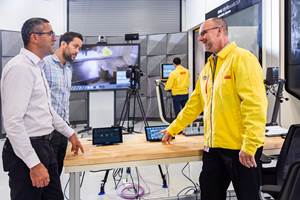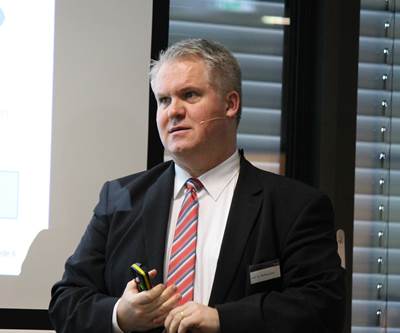Niklas, a 17-year old apprentice, is operating a deep-hole boring machine at Deckerform’s mold shop in Aichach, Germany. Although he is only in his first year of training, Managing Director Anna Tschacha is convinced that the young apprentice has already acquired enough skills in mechanical machining to be working the machine on his own. “Since I’ve learned about the trade at our technical college via internships, I wanted to be an industrial machinist,” Niklas says. “Many of my friends are learning a trade in the field of manufacturing, and it is a well-respected profession. Friends told me about Deckerform and recommended the company as a vocational training company, which is also only a 10-minute drive from home. I have never regretted my decision to start my career here because management supports and encourages every employee, including the apprentices.
Niklas is one of what are currently 15 apprentices in the 80-men-strong company, which trains apprentices in machining, toolmaking, product design and project management.
Founded in 1992 as Deckerform Production Systems with around 35 employees, the mold shop has developed into a leading player in the international tool and moldmaking world. Managing Directors Rosemarie Linzmeier-Tschacha, Anna Tschacha and Franz Tschacha have always stood behind their slogan that the development of plastic products is their passion and that motivated and highly-skilled employees always deliver the best performance.
Apprentices Secure the Potential for Growth
It certainly pays off for Deckerform to invest in its employees because for many companies, it is not easy to find skilled staff. This is especially true in the states of Baden Württemberg and Bavaria, where the youth unemployment rate (for persons 15–25 years of age) is the lowest in Germany. Here, only 2.5 percent of people in that age range were unemployed in Baden Württemberg in March 2018 (where companies like Daimler Chrysler, Bosch, Porsche and many other big players are located), and 2.7 percent were looking for jobs in Bavaria, where Deckerform is based. In March 2018, the youth unemployment rate for 15–24-year olds in Germany was 4.8 percent, the lowest rate in the European Union, where the unemployment rate was 15.9 percent across all member states.
As a result, most companies like Deckerform don not have a choice but to take on apprentices to meet their long-term supply of adequately trained workers to secure the potential for growth and innovation. However, many small and medium-sized enterprises (SMEs) in other countries fear that apprentices will leave at the end of their apprenticeships, taking their skills with them. German companies do not share that fear, and the majority of apprentices stay.
So, what is different in Germany, and why does its apprenticeship approach seem so hard to copy? To answer this question, it is important to shed some light on why manufacturing is more appealing to (young) people in Germany than in many other countries, including the United States.
Part of the story involves history and culture. Germany’s industrial power was built on a core of family-owned businesses, many of which date back to the 19th century and which often operate out of small towns, similar to the aforementioned example of Deckerform. These family-owned businesses plan for the long term, pride themselves on quality and see themselves as having social obligations to the local community. These companies thrived in the decades immediately after 1945 when the economy boomed as a result of the need to rebuild a war-ravaged country. Moreover, while many companies look for hitting short-term targets, the Germans have been able to concentrate on making small improvements to their products that help to keep them ahead of the field.
And then there is the support that is given by the state. One key pillar of support is provided by the Fraunhofer-Gesellschaft, a part publicly-funded research organization that provides applied science for companies that would otherwise find the cost prohibitive.
Place an Emphasis on Vocational Training
Another part of the story involves vocational training, which enjoys an excellent reputation in Germany. The emphasis on vocational education combined with academic studies and on-the-job training for apprentices is globally admired.
The fact that Germans are accustomed to the work-study model masks some of the challenges other countries might face in adopting it, such as doubts about the value of vocational training. The apprenticeship route is a genuinely respected and valued alternative to college or university, and it pays off.
The fact that Germans are accustomed to the work-study model masks some of the challenges other countries might face in adopting it.
“Learning and earning” on the job is an attractive alternative to studying, leaving many students with a crushing level of student debt. “We are paid to learn, how great is that?” Niklas says. “We gain an education while incurring little or no debt.” On the other hand, employers like Deckerform gain a pipeline of skilled workers who have been shown to increase productivity and boost the bottom line. It’s a win-win.
The same is true for Anna-Lena Amon, apprentice for Mechatronics at Hofmann Innovation Group (Lichtenfels, Germany). Like many SMEs in Germany, the tool and moldmaking company knows that to give back to the communities where its employees live and work is an important corporate social responsibility. For example, Hofmann participates in an educational program known as Girls Day. Each year, manufacturing and technology companies in Germany are invited to host a career day for young females, ages 12–16, in which they educate the girls on various technical and professional careers. Girls Day has evolved into an important recruitment philosophy, encouraging and motivating female participants to seize career opportunities in vocational training and technical areas that typically have had fewer females.
“Next to the mandatory internships at our Realschule [which is a secondary school preparing students for apprenticeships and vocational qualifications in Germany], I participated in Girls Day to find out what vocational training would be right for me,” Anna-Lena says. “I tried different things in care facilities, manufacturing companies like Hofmann and offices. I found that a technical profession would be most suitable and applied for an internship at Hofmann, where I ended up staying and started an apprenticeship in Mechatronics.”
“In the first year of apprenticeship, we are almost exclusively in our training workshop, practicing turning and milling. Then there is the basic training in pneumatics and, for example, learning how to work with cordless screwdrivers, cutting threads, or making a hammer with the help of files, milling and turning,” Anna-Lena says. “But apart from what Hofmann teaches us to learn the trade, it is the general atmosphere within the company that is appealing and makes you want to go to work every morning. It is a family business where people care about you and let you take over responsibility for certain jobs right from the start.”
Internships Give Initial Impetus
Jonas Kluge, a young apprentice in industrial machining at Mayer Feintechnik (Göttingen, Germany), has also found his way into the profession through an internship. Jonas decided to “test” the job he had chosen, called a “one-year internship,” before starting an apprenticeship after school. “This is common practice in Germany,” he says. “You get a one-year contract similar to the one for a regular apprenticeship, which defines your workload and subjects. You join the apprentices going to Berufsschule and get a small salary as well as social insurance.”
Apprentices earn a wage of 750–1000 euros per month, which is not a great earning, but enough to get along and make a living while learning a trade and going to school. More than 350 professions are officially recognized as training occupations in Germany, and more than 60 percent of high school graduates regularly participate in the apprenticeship system. That’s because Germany’s labor market values workers trained for specific occupations.
More than 60 percent of high school graduates regularly participate in the apprenticeship system.
“The way this dual training program works is that students apply directly to employers for apprenticeships,” Niklas says. Companies like Deckerform usually try to recruit their apprentices via newspaper ads, participation in trade shows, job fairs and participation in various fairs of the Chamber of Industry and Commerce (IHK). According to Anna Tschacha, it is important to put the word out there and educate young people about the various vocational training opportunities and trades that are available. How many know what a tool maker or moldmaker at the age of 15 is doing? Not many, that is for sure.
Encourage Kids Early
As a result, it is important to encourage young people to start thinking about their future early. Many students are allocated to high school (known as gymnasium at the age of 10) to prepare for the "Abitur" (the A-level-equivalent qualification needed to get a place at university), while others go to schools dedicated to vocational education before choosing apprenticeships or specialist vocational schools at the age of 14 or 15. From the age of 14 (depending on the respective state), all school children have mandatory internships in different companies. The mandatory internships last two to three weeks and are conducted at local companies. Students can also visit a career adviser in their local region for one-to-one advice and guidance.
One reason why many kids decide to start a career in engineering or manufacturing in Germany is that it is a valued occupation, and local companies are deeply involved in their local communities to further spread the word. Together with the education system, employers are there to help young adults succeed if they aspire to get into the industry.
One reason why many kids decide to start a career in engineering or manufacturing in Germany is that it is a valued occupation.
The German system is not without its flaws, of course. Falling numbers of students, the threat of a shortage of skilled workers and often problematic transitions into the job more than ever require close cooperation between schools and companies. Therefore, the IHK supports partnerships between schools and companies. The aim of the school partnerships is that secondary schools and companies cooperate, develop a better mutual understanding and benefit from each other.
Machine tool manufacturer Grob (Mindelheim, Germany) is one of many companies cooperating closely with local schools. Considering that the company employs 100 new apprentices per year in mainly technical professions, it is evident they need to go out there and recruit students to work for them.
One of the projects that the 4,500-men-strong company is engaging in is called “Come with me,” where Grob apprentices go to secondary schools to conduct a specific technical project with interested kids. “The project takes about six school lessons, and one apprentice builds something like a small saw or some other tool together with four or five school students in grade seven or eight,” Manager Mechanical Training Department in Mindelheim Werner Drexel, says. “Moreover, we go into ‘Realschulen’ where we cooperate with selected schools on long-term projects. Here, students simulate a job interview with us. They come to Grob for internships—also during their holidays—and learn about the complete manufacturing chain including design, manufacturing, quality control, assembly and hand-over to the customer.”
According to Drexel, Grob is not only interested in recruiting potential trainees or apprentices but is also committed to conveying an interest in technology, manufacturing and skills to students in secondary education.
Back at Deckerform, Anna Tschacha says, “Our apprentices usually stay at our company because we value their work, and they know that we encourage and support them. Most applications come in via word-of-mouth because people know Deckerform is a good place to work. It pays off to value vocational education and to invest and have a stake in it.”
Our apprentices usually stay at our company because we value their work, and they know that we encourage and support them.
About the Author
Barbara Schulz
Barbara Schulz is Gardner Business Media’s European correspondent. She can be reached at bschulz@gardnerweb.com.
Related Content
Hands-on Workshop Teaches Mold Maintenance Process
Intensive workshop teaches the process of mold maintenance to help put an end to the firefighting culture of many toolrooms.
Read MoreMMT Chats: The Connection Between Additive Manufacturing Education and ROI
This MMT Chat continues the conversation with Action Mold and Machining, as two members of the Additive Manufacturing team dig a little deeper into AM education, AM’s return on investment and the facility and equipment requirements to implement AM properly.
Read MoreHow to Use Continuing Education to Remain Competitive in Moldmaking
Continued training helps moldmakers make tooling decisions and properly use the latest cutting tool to efficiently machine high-quality molds.
Read MoreHow to Foster Innovation Through a Culture of Education, Mentoring
Dynamic Tool Corp. shares its strategy for building a team with the right attitude and aptitude to deliver innovation that meets customer expectations.
Read MoreRead Next
International Perspective: Twenty Years of Tool and Die Making in Europe
The European tool and moldmaking industry has moved from manual to industrial production via internationalization, digitalization, automation and communication.
Read MoreHow to Use Continuing Education to Remain Competitive in Moldmaking
Continued training helps moldmakers make tooling decisions and properly use the latest cutting tool to efficiently machine high-quality molds.
Read MoreReasons to Use Fiber Lasers for Mold Cleaning
Fiber lasers offer a simplicity, speed, control and portability, minimizing mold cleaning risks.
Read More


.jpg;width=700;quality=80)
.jpg;width=860)
.jpg;width=860)





















